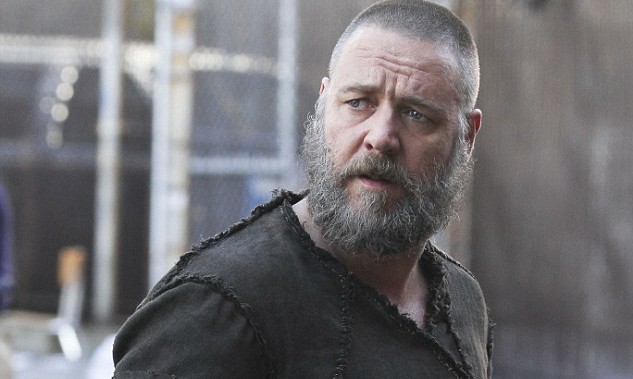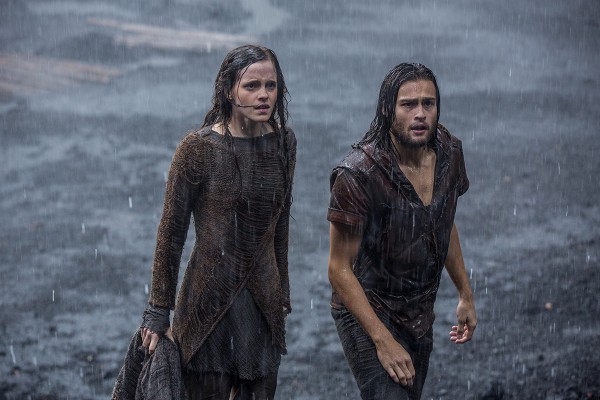Genre: Religious Epic/Action
Premise: (from IMDB) A man is chosen by God to undertake a momentous mission of rescue before an apocalyptic flood destroys the world.
About: Noah was written and directed by Darren Aronofsky (Black Swan, The Wrestler) and co-written by Ari Handal. As most religious pictures do, this film is dividing audiences, most of whom haven’t even seen it (I love when the religious community does this – “Don’t go see this!” “Have you seen it?” “Uhh, no. But that’s irrelevant!”). Ari Handel is a longtime Aronofsky collaborator. He received a “story by” credit for Aronofsky’s most ambitious film, The Fountain, but Noah is his first full screenplay credit. Predictions for Noah’s box office this past weekend were all over the map, with many predicting it would tank big time. But the film did a respectable 45 million dollars.
Writers: Darren Aronofsky and Ari Handel (based on the book “The Bible” written by Moses, David, Ethan and others).
Details: 262 pages!!!!!!!!! (without pictures, about 130 pages) — early draft
Awhile back I said, “Don’t write ‘religious’ scripts. They don’t sell.” Then ‘religious projects’ become all the rage. Should we chalk that up to the, “Nobody knows anything,” William Goldman quote that writers use in defense of all their strange ideas? “I’m going to continue to push my coming-of-age story about a man frustrated with his 20s because… nobody knows anything!” No offense but, don’t do that. Please.
Here’s how Hollywood works. One day, nobody’s buying religious scripts. Then a huge director who’s had a nice little streak going – somebody like Darren Aronofsky – says he wants to make a big Noah epic. Everybody’s a little nervous but no one wants to say no to a talent like Aronofsky so they say, “Okay, I guess we can jump on board with that.”
The news circulates around town that Aronofsky’s next movie is a big religious epic, and all of a sudden, guess what? It’s okay to buy big religious epics! Whether the other studios want competing projects, or to be prepared if Noah succeeds so they can jump on the heat, they buy these scripts and start developing them.
My point is – there IS some logic to it. It’s not like one day everyone starts buying religious specs because “Nobody knows anything.” There’s almost always a cause and effect going on.
Which leads us back to “Noah” and its heaping 262 page retelling of the epic story (well, not really 262 pages. There are a lot of weird pictures in it and if you take those out, it’s only about 130 pages). I should preface this by saying I’ve never read the Bible and, in fact, had my Sunday School teacher come to my parents and tell them, “I don’t think this boy should be in Sunday School anymore.” In other words, I’ve been officially rejected by God. This very well may factor into my review.
So in Aronofsky’s version of “Noah,” we have a guy named Noah. Noah is a tree-hugger. He hates how careless we’ve become with our land. Not only are we knocking everything down and dispersing our trash everywhere, but we’re killing all our animals too! Noah, it turns out, is also a big-time vegetarian. He refuses to munch the meat.
Noah preaches this gospel to his family, two boys (Shem and Ham), a baby girl, and an adopted girl, Ila, who was left for dead after her village was slaughtered. Everyone looks up to Noah so they follow in line, even when he claims to have been contacted by God, who happened to mention that he’s going to destroy the world.
Noah believes he’s been chosen to save all the animals on the planet, so he convinces his family to build an animal Ark for when the floods come. Since this takes up the majority of his time, Noah’s unaware that Ila takes a liking to his son, Shem. Possibly because Noah’s such an animal freak, Shem and Ila learn about the birds and the bees, and the next thing you know: preggers!
While Noah’s building the Ark, an evil warlord named Akkad keeps bothering him for a spot on his boat, going so far as to sick his army on the resistant Noah. Thing is, Noah’s buddies are these huge 6-armed monster things who ward Akkad’s army off.
But eventually the rains come and Akkad is able to get on the ship as it shoots off to sea. It’s here where Noah has another vision – this one that he needs to kill his family off (in a very humane, systematic way of course) so that there will be no more humans on the planet, just animals. It’s a grand plan, but ruined when he finds out that Ila is pregnant with his grandchild. Will Noah finally come around? Or will he stop humanity by killing off his only grandkid? Oh yeah, and what about that Akkad guy? What nasty things does he have in store? Check out “Noah” to find out.
I’ll be the first to admit that Aronofsky is one of those filmmakers who brings so much to the table stylistically, that you can’t judge his scripts the same way you can judge scripts like “Non-stop.” You really have to see an Aronofsky film to make a final judgment. However, I do have some thoughts on the script itself.
First off though, I have some questions for the religious folks. Do people really believe that the earth used to have giants and 6-armed monsters and talking snakes? Why did these things die off and why isn’t there any evidence of them? I guess they may have died off in this flood? Is that the story? Still, if animals used to be able to talk, why can’t they talk anymore? Do religious folks have an answer to this? I have to be honest, it all sounds a little silly to me.
But even if you can get past that, “Noah” is still a strange read. Noah himself is kind of a nut bag. He has a nice little Save the Cats moment early on (yup, I did the plural thing – cause it’s Noah) where he saves this Bison from sure death. And his general attitude towards animals makes us feel all warm and fuzzy towards the bearded one.
But dude, what’s up with wanting to kill your family off? Don’t you think that’s a little extreme? There’s this moment that comes in every script where your main character has “the choice.” It’s the most difficult choice he’ll ever be presented with in life – his “Sophie’s Choice,” if you will – and it should include the thing he cares most about and the thing that is ultimately right.
So here, when Ila’s babies are born (spoiler alert – she has twins!), Noah can either kill them (so there will be no more chance of reproduction) or let them live. He believes so much in a human-free world, that he really really really wants to kill his grandchildren. But in the end, he just can’t.
Here’s my problem with this choice – we know there’s no way in Hell that Noah’s going to kill two babies. He just isn’t. So the choice is devoid of any drama. And I think this problem stems from giving Noah a ridiculous stance to begin with – the guy wants to kill off his own family??? Come on. No audience is ever going to believe that Noah’s capable of doing such a thing. Therefore, any further story elements that try to build off of this are bound to fail.
The structure for this script was also really wonky. The first 70 pages (35 pages w/o pictures) are dedicated to getting to know Noah and his family. We then jump forward 10 years, and the Ark is 80% finished. Then at around page 150 (roughly page 80 w/o pictures), we’re off in our Ark.
Since, up to that point, most of the script was about building the Ark, the story has to reset. Where does it go from here? What’s the engine that’s driving it? Unfortunately, nothing really. They only kind of try to look for land. Therefore it becomes all about Ila’s pregnancy. And, as I stated above, that storyline doesn’t hold any water.
To be honest, this story was going to be a clusterfrick to wrangle in no matter what they did. The building of the Ark was always going to take a long time, forcing the screenwriters to condense time whenever possible. And whenever you condense time, you impose an artificiality onto the story. You can get away with it a couple of times. And you can use tricks to distract us from time jumps (Forrest Gump does a good job of this). But at a certain point, if you have too many jumps, the script starts to feel like a broken record, scratching and sputtering and starting back up again.
That was my problem here. There was no rhythm to the story. They probably should have gone to one extreme or the other. Either make the entire script about building the Ark, with the climax being the beginnings of the rain, or get them on that Ark by the end of the first act, and then build a story around them on the sea (probably trying to find land again). Aronofsky tried to do both, and I think that was its undoing.
I will give this to Aronofsky: He did something different. I would much rather see this movie than the super-safe G-rated Bible Belt Productions version of Noah, where everyone would have been squeaky clean and perfect. These characters here had a lot of baggage to hold onto, and that at least made them readable. Still, the weird structure, the half-fantasy element, combined with a psychopathic Noah turned me off.
[ ] what the hell did I just read?
[x] wasn’t for me
[ ] worth the read
[ ] impressive
[ ] genius
What I learned: Try to avoid writing scripts where your story completely reboots. “Noah” was so focused on one thing in the beginning (building this Ark), that the story lost its footing once it moved past that. No pun attended, but after that boat left the dock, this script was lost at sea.
What I learned 2: If you’re going to include pictures in your script, make sure their presentation looks professional. This is the second script I’ve read this month that had pictures in it, and in both cases, the pictures are haphazardly thrown up onto the page. It looks sloppy, which makes the script look sloppy. Use some uniformity, some placement plan, some technique. It goes a long way.



